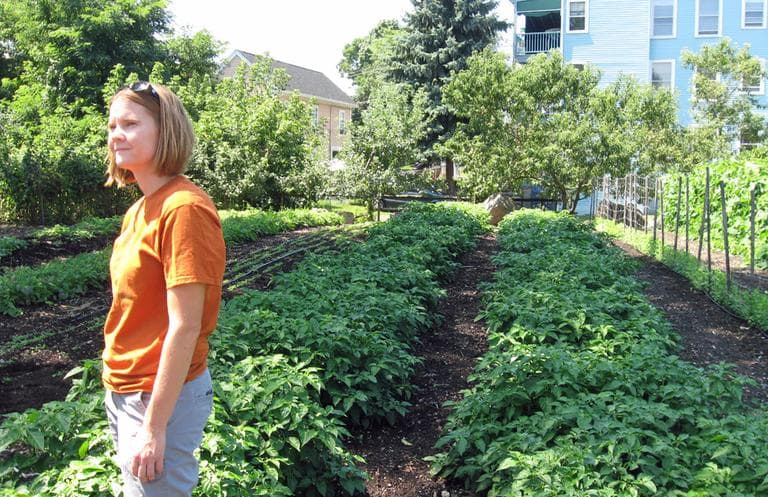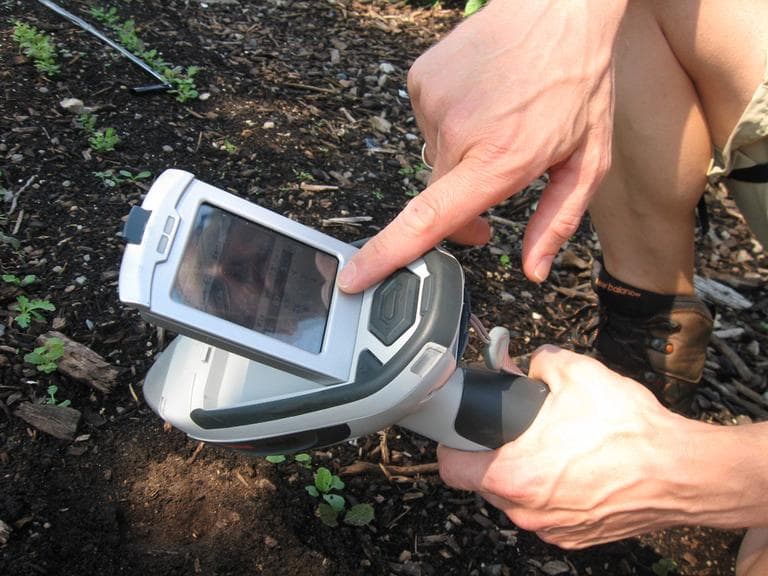Advertisement
A Crisis For Urban Gardeners: Rising Levels Of Lead In Boston Compost
ResumeThe city of Boston started up its fall program of collecting leaves and yard waste on Monday. That debris gets turned into compost used to fertilize local parks, and for years it's also been available for free for urban gardening.
Maria Barros used to use that nutrient-rich mixture — nicknamed "black gold" — to grow healthy, inexpensive vegetables and herbs at her home in Roxbury.
"Everything is fresh," she said. "I'm so happy to make dinner. I can't wait to put the dinner on the table. And it's tasty, too. And it saves me money — a lot of money."
That compost had another benefit: It let urban gardeners avoid growing produce in city soil. Because, like in many other urban areas, the soil in Boston often contains unsafe levels of lead. But in recent years, lead levels in the city's compost have risen to the point that many gardeners don't feel safe using it, either. So Barros continues to grow some vegetables in soil, and she then boils her food because she believes that might get rid of any lead.
But that won't help. Scientists say the best way to avoid lead in homegrown produce is to grow it in pure compost in raised garden beds, not soil. But community garden groups no longer want the city of Boston's compost because of worries about lead, and they want this crisis in urban gardening solved.

At a community farm in Dorchester run by the nonprofit urban gardening organization The Food Project, geochemist Dan Brabander of Wellesley College and The Food Project's Kathleen Banfield are testing lead levels. Brabander takes a device that looks like a radar gun, presses it on the compost near some pepper plants and, after a few seconds, a tiny screen displays the amount of lead.
"It's 107 parts per million, plus or minus nine," he reads from the display.
That's considered a reasonable lead level. But this isn't compost from the city's supply. Because of the lead concerns, The Food Project now buys compost that contains less lead from suburban farms.
We asked Brabander what kind of increase in lead levels he was seeing in the compost that concerned him.
"From 2009 to 2010," Brabander explained, "the concentration of lead in the city of Boston compost was around 200 parts per million," which is about half of what the Environmental Protection Agency considers a worrisome level for lead in soil. "Then we saw a doubling of the concentration of lead in the city compost."
Brabander's lab at Wellesley is trying to figure out where that lead is coming from. Scientists suspect the source may be old paint chipping off homes or old leaded gasoline mixing into soil and leaves, all of which gets churned into compost. But there are no Massachusetts or federal guidelines for lead levels in compost, so Brabander and Banfield wish Boston would make safer compost by collecting kitchen waste, such as food scraps, and blending it with yard waste, a process that cities including San Francisco, Seattle and Portland, Ore., already do.
From the community farm near Dudley Square, we walk down a side street called Brook Avenue. It's a residential neighborhood where many homes have gardens, many of them planted in raised beds with compost from The Food Project.
Maria Barros, the Roxbury home gardener, has one of those beds, and we stop in her yard so Brabander can test her compost.
"We're analyzing near the middle of the raised bed to get sort of a representative concentration of lead," he explains.

The reading: 106 parts per million.
"Pretty good," Brabander says, "and very much like what The Food Project has in their main garden."
But the lead levels in the soil, where Barros is also growing vegetables, are a different story.
"Sacha, can you see the number for lead?" he asks me.
Out loud, I read the display on the testing device: "It's going from 750 to 31 to 725. It keeps changing. Now it's up to 740."
"So this soil would exceed the EPA benchmark of 400 parts per million," Brabander says, "and it's pretty representative of the concentrations that we see in this neighborhood."
"Do you think it's okay for some of the urban gardeners you work with to plant right in the soil?" I ask Banfield. "Or do you usually advise that they use a raised bed because of the lead risk?"
"We try to at least communicate with them ways that they can reduce their exposure risk," Banfield replies. "There are some simple strategies that you can use, like wearing gloves or working in soil that's moist so that you're not inhaling the dust clouds."
She also also says that if urban gardeners are worried about lead in their produce, certain crops are less safe to grow in soil than others. For example, kale and collard greens are better off grown in pure compost because they absorb lead in higher levels than non-leafy vegetables.
Lead in food accounts for only a small percentage of overall lead exposure in children — and children are the biggest concern, since lead poisoning can hurt them developmentally. But Barros wants to avoid any possible risk from the food she grows and eats with her 25-year-old daughter and 12-year-old grandson, who live with her.
"Yes, I worry," she says. "Sometimes I say, 'Well, everybody in the neighborhood grows it without the bed and nobody gets sick.' Nobody gets poisoning. I don't know if you get sick slowly, later on."
Boston's Department of Public Works is now looking for a new contractor to run its composting site, but it says food composting is more complicated and not in its current plans. And although DPW officials acknowledge that lead levels in the city's compost have increased, they say their tests show that the average lead level has stayed just within government safety standards. If any gardening groups inquire about using city compost, the DPW says it will provide the most recent lead testing results.
This program aired on October 15, 2012.

